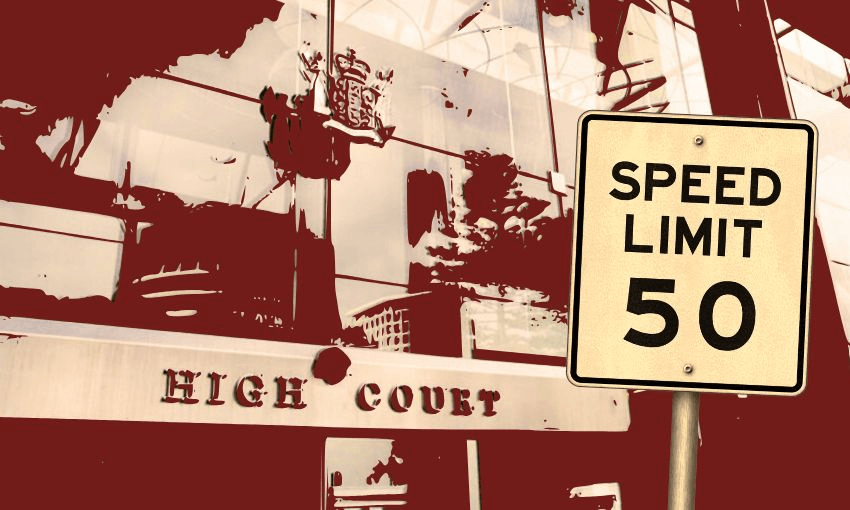A transport safety advocacy group has filed for a judicial review of the government’s reversal of speed limit reductions, but the Crown is arguing it’s too late. Lyric Waiwiri-Smith reports from Wellington High Court.
A call for the reversal of the government’s reversal of speed limit reductions was heard in Wellington High Court on Wednesday morning, but the bid by a transport safety advocacy group to halt the changes was “too late” to stop a multimillion-dollar legislative change already on the go, a Crown lawyer said.
Movement, a transport safety advocacy group led by transport planner Bevan Woodward, filed an application for a judicial review of the move to increase speed limits in mid-January. The group also filed a request for interim relief on March 6 to halt all current progress on speed limit reversals until the case was heard in full later in the year.
The case comes nearly six months after former transport minister Simeon Brown (his cabinet colleague Chris Bishop picked up the transport portfolio in the January reshuffle) signed the Land Transport Rule 2024, which would reverse speed limit reductions introduced by the Labour government in 2020.
Movement’s challenge calls for the court to decide whether new speed limits should be scrapped due to safety concerns, whether Brown had acted in accordance with the Land Transport Act, and if the costs to councils in implementing these changes, and then changing them back should Movement succeed, would be worthwhile.
The Crown had proposed the substantive case be heard after July 1, when reversals will automatically come into effect. Lawyer Sally Gepp KC, representing Movement, told Justice Radich she did not accept that enough substantial work had been completed, as only a sixth of road-controlling authorities had registered some of their speed limits, with the vast majority of those yet-to-be-registered changes (1,528) sitting with Auckland Transport.
Gepp said that there was “no evidence” to the Crown’s position that “millions” had already been spent on reversals. She said she was aware the New Zealand Transport Agency had so far spent more than $300,000 on reversals, with 270 changes already registered (and 250 submitted for registration), but this spending would not be affected by the interim order.
Justice Radich heard that the applicant’s main issue was with safety. Gepp pointed to the Land Transport Act’s requirement to promote safe road behaviour and to ensure Aotearoa’s obligations with international requirements are upheld, as well as the function of the minister to promote safety in transport.
Advice received by the minister on reversing speed limits had “consistently [said] that that was unsafe, and that that would increase the risk of fatalities and injuries”, Gepp said. She claimed the minister was “irretrievably committed” to the reversals despite advice to the contrary – a position she said was backed by the minister not providing an affidavit.
Gepp also pointed to what she saw to be a lack of work undertaken by Auckland Transport. “It’s done very little work and is quite content to deal with the implications of the interim order,” Gepp said. “It is deliberately not making those reversals … in the knowledge of this hearing.”
Crown counsel Polly Higbee, representing Brown, labelled the case a “kitchen sink proceeding” and said Movement was simply “too late” to try to stop the policy change – they needed to have acted last year. She claimed a reversal of the reversal now would create confusion for drivers, and cause imbalances in cities where reversals had taken place in some areas and not others. In the Hutt Valley, 122 reversals had been made in school vicinities, with a further 55 school vicinities still awaiting them.
Changing speed limits wasn’t as simple as “somebody nailing up a road sign”, Higbee said. There is a process of design that assesses road safety, and a need for safe infrastructure such as road markings. “All the resources used to do those things are in hot demand at the moment,” Higbee said, and drew on evidence from one road control authority that estimated $1m had already been spent on this process.
“This is a multimillion-dollar process that is going to be partially suspended should the interim be granted,” she said.
On the large number of reversals still to take place in Auckland, Higbee said the city already had 32 urban connections where the speed limit reversals had come into effect. “So yes, Movement is correct that there is a lot to go in terms of registering speed limits,” Higbee said, “but that does not undermine the extent to which Movement’s order seeks to partially suspend a large programme of work.”
Great news for Auckland today! Auckland Transport has now confirmed where Labour’s blanket speed limit reductions will be reversed as a result of our Government’s new sensible speed limit rule.
[1/4] pic.twitter.com/DGQyMAnIzP
— Simeon Brown (@SimeonBrownMP) February 27, 2025
It was “dangerous” for the court to speculate Auckland Transport’s position, Higbee said. The agency had chosen not to be involved in court proceedings, so Movement purporting to speak for Auckland Transport should not be a position accepted by the court, she said.
Justice Radich heard that the Crown acknowledged the safety concerns shared, but “ultimately, this is an assessment of what level of risk an elected official is willing to take in terms of policy choices”.
Movement was an interest group that had already had the opportunity to have its say in public consultations, Higbee pointed out. “This court should be wary of creating a situation where people who are unsuccessful in the political arena continue that fight in the courts.”
Justice Radich will make a decision on the interim order in the coming days.





